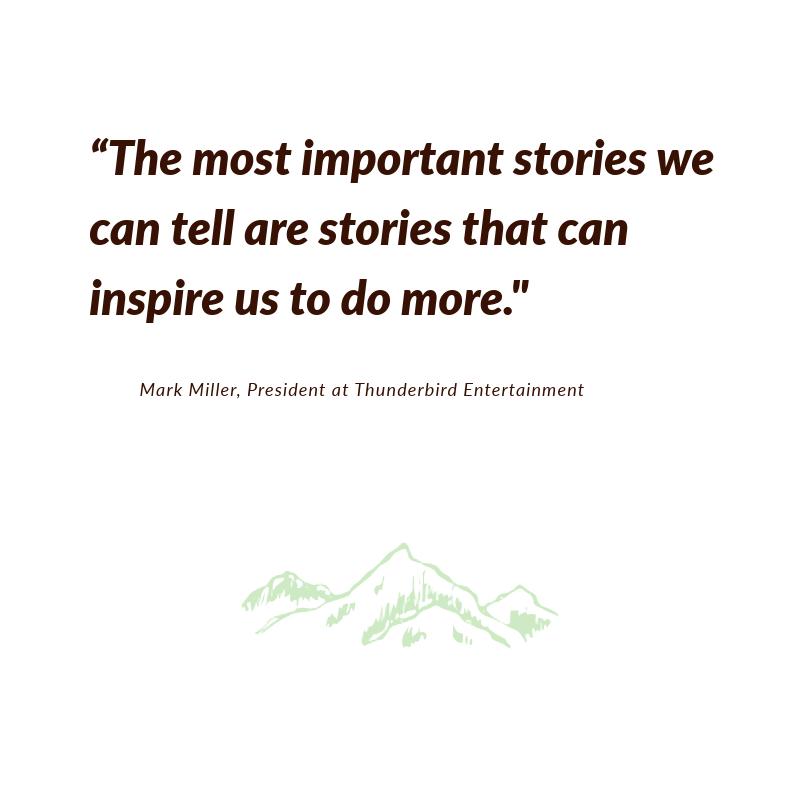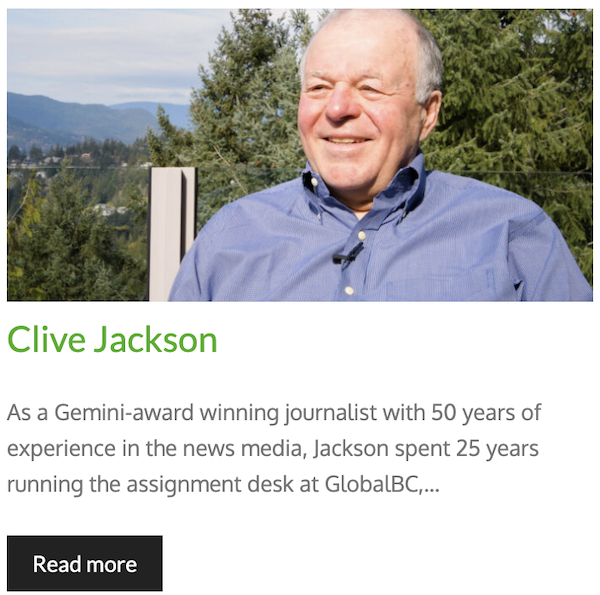The System of Things
Chapter One
“When you boil it all down – we’re all storytellers.”
Hold on, TV producer Mark Miller! We’re all storytellers?
Yes, we are, Mark argues. Why? Because we’re all the authors of our own story and contributing authors to the stories of others.
“You know, a story is an event in our lives where we’re told something that we don’t know. It’s not really a story if you already know the outcome. It’s not really a story if you know all the answers. So, story is revealing something unknown to us.”
Think about it this way:
These two bears aren’t storytellers in the traditional sense. They’re not journalists; they’re not even ravens, with their incredible birdbrain and complex language skills. And science hasn’t determined how or if bears remember events, nor how they communicate experiences. But in the living of their lives, they have created a narrative – they have authored their story. And their story – if we choose to listen – can inform and inspire, it can spark new stories that can inform and inspire.
And so too can our stories. But don’t take my word for it.
“Many Canadians are doing remarkable things, and producing remarkable, new innovations. But what we need is communication.”
Former prime minister Kim Campbell is right, of course. We need to share our perspectives and ideas. Why?
“If you and I disagree on something, nattering at each other might not work, but if somebody else comes along who you see as having your view, but who now says, ‘well now I actually have a different view’, you’re more likely to listen to that person. Learning respectfully to listen to other people and understanding how important cognitive diversity is in avoiding all the cognitive biases… and all the things that lead us down the garden path when we have important decisions to make.”
That, of course, is how change is made. And few understand change better than our former prime minister.
“I had a responsibility to participate and, of course when I got older, that translated into the democratic governance of my society. If I could make a contribution, then I should.”
Kim Campbell is not only a former prime minister, but Canada’s first and, so far, only female prime minister. And regardless if you support the former prime minister’s politics or not, her story should inspire.
“I’m really touched by how many people said to me, ‘I was in grade eight when you became prime minister and I just thought it was so incredible.’ Or, ‘I was in university and it was the biggest deal and it was so wonderful’. And they didn’t say, ‘and then you lost and I felt terrible’. What they remembered was that I made that breakthrough. And, so, a woman being prime minister was no longer a hypothetical. It was a reality.”
Indeed, Kim Campbell’s story – the living of it, the sharing of it – has shaped, and continues to shape, society’s story.
“I’ve looked to find ways to use whatever little virtual tiara that flashes former PM to open door for people and to continue to make a contribution.”
Which doesn’t make Kim Campbell a better storyteller than you or me; it doesn’t make her story matter more than yours or mine. Our former prime minister believes strongly the story you want to author? It can be just as impactful as hers.
“We can’t all be in parliament. We have to decide what it is that that we can contribute and want to contribute. You know, if you’re somebody who has your heart set on being a doctor, you will take a different approach than somebody who wants to get a bachelor’s degree in science and then go on into direct engagement. The thing is, find what your passion is, find out what you’re good at, what you feel you can do to contribute, and then do it.”
Indeed, Kim Campbell first ran for office because she wanted to shape the story – the narrative – of her community, her province and, eventually, her country.
Her ability to do so, in many ways, was shaped by the stories shared by people like you and me.
“There are people living heroic lives, and people doing amazing and wonderful things. And when you hold elected office, people want you to see what they are doing either because they are proud of it and they want to show off their community, or they have interests they want you to understand. Human beings are quite wonderful, and it’s an honour to serve them. And you need to serve them in a way that is in the national interest – not in your own interest. There are a lot of people for whom politics is a vehicle to enrich themselves and make themselves feel important. If you’re not one of those people, then maybe you should elbow your way into the arena.”
Former prime minister Kim Campbell is right.

Whether we run for office to enhance our nation’s story or craft a well-researched idea that can help decision-makers advance a better narrative for Canada, our story matters. All stories matter. And the best stories? They aren’t always the obvious ones. Just ask Mark Miller.
“The most important stories we can tell are stories that can inspire us to do more. And that often involves characters that are aspirational – that we can join with in their journey, their aspirational journey.”
Mark once covered politicians like Kim Campbell as a journalist on Canada’s Parliament Hill.
“I think I was the only journalist on The Hill that didn’t have a university degree. And so a lot of people looked down on me and frowned on me. But I guess I was too dumb to care. I continued to ask what a lot of people thought were simplistic questions and I learned that I could unlock information that was interesting by kind of playing the every-man.”
What Mark realized with time was that his ability to ask questions that resonated with ordinary Canadians could be used to uncover and share the stories of everyday Canadians.
“We pick these blue-collar worlds where you see these very unexpected heroes.”
Unexpected heroes like, say, tow truck drivers on mountain highways – the main characters featured in Mark’s celebrated TV series, Highway Through Hell.
“You never would think that a tow truck driver is going to be the guy that saves your life. Before we started this show, I think many of us viewed tow truck drivers as kind of rough around the edges and maybe not to be trusted. Turns out, they’re really, truly the unsung heroes of the highway.”
And that’s the point Mark wants us to understand.
Kim Campbell’s story matters. The tow truck driver’s story matters. And by sharing these stories – and learning from them – we can find new ways to do better by people and nature.
But what does any of this have to do with this class specifically? Well, Mark says, “At the end of the day, whether you are lobbying the government to build a park to protect bears, or whether you’re trying to raise money through a grant to hire a research biologist to go study the DNA of owls, you’re still telling a story. You’re telling a story writing the grant.”
In other words, we should all learn to tell better stories, starting right here, right now.
“The question is: how can you be the most effective storyteller? And, I think, to be effective make sure your message is simple, make sure it’s driven by passion and curiosity, and make sure it’s driven by fact – that your information is good.”
Good points, Mark. And whether we’re talking about artistic storytelling or research-based storytelling, writer Ian Brown says the journey to becoming a better storyteller really starts with this:
“You have to go where your curiosity takes you. This is what storytellers and writers and filmmakers have to learn. They have to learn to recognize that weird little yank that goes on when you see something that’s kind of interesting.”
Like what? Ian offers up this example.
‘Oh, well, that’s weird. There are four guys with man-buns at that bar. This must be a man-bun bar!’ That might not turn out to be the most important story in the universe, but it might be really interesting. You might be in the centre of man-bun-ism!”
But even if we follow our curiosity – even if our research sparks an idea that will make people talk – a good story still needs to cut through the noise.
“To break through, you’ve got to know what you’re doing. You’ve got to be able to tell the story in a way that when you or I or a passer-by, who has no intention of listening because we have so many other things to do on our phone, grabs my hackle of attention.”
It’s a lesson bees have long understood.
Bees? Yes, bees.
When those hovering pollinators find that sweet, sweet nectar of a flower, they could keep that knowledge to themselves.
But they don’t.
Bee society resembles Canada’s – a constitutional monarchy, even if it’s the queen, not the king, who rules. Still, like Canada, even with a monarch as the head of state, the bee’s democracy is one that thrives because it’s cooperation that’s rewarded.
How?
Bees have been known to give their fellow hive-dwellers dance performances, acting out their food gathering experiences in order to help other bee citizens find and gather food in places where the performer has had success.
Look, this bee dance isn’t going to make the cut for Mary Young Leckie’s next award-winning movie or play. Heck, it’s not even going to rival your younger sibling’s recital. But increasingly scientists are seeing this bee dance as a form of storytelling.
And it’s not even rudimentary storytelling. Why? Because bees understand what too few humans do: We learn best when we’re entertained.
It’s why former news editor Clive Jackson says we need to learn from the bees. Even the best, most serious stories need to have an element of entertainment in order to connect.
“You’ve got to woo people. You’ve got to bring them in.”
Producer Mary Young Leckie says that’s why we need to take our news – our ideas, our research – and find new ways of sharing these stories.
“Write a story about the hummingbird. Or write a poem about the moose. Or get in a canoe and write a song about paddling.”
Mary is no stranger to using art to advance a message she wants society to hear. But she has learned from experience: for the message to resonate, the story must entertain.
“I make sure they’re entertaining because I don’t want anybody to feel that they have to eat their vegetables when they come to see my plays, or want to see one of my movies.”
After all, no one likes being lectured. No one likes hearing straight facts. We all want a bit of fun with our education. We all want a story.
Even the bees.






